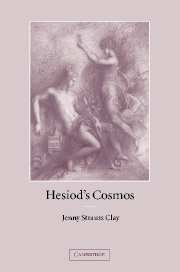Book contents
- Frontmatter
- Contents
- Preface
- Acknowledgments
- List of abbreviations
- Introduction
- 1 Orientations: the Theogony
- 2 Orientations: the Works and Days
- 3 Overtures
- 4 The origins and nature of mankind
- 5 The two Prometheuses
- 6 Perspectives on gods and men
- 7 Hybrids
- Conclusion: Hesiod and Calchas at Aulis
- Bibliography
- Indexes
3 - Overtures
Published online by Cambridge University Press: 04 August 2010
- Frontmatter
- Contents
- Preface
- Acknowledgments
- List of abbreviations
- Introduction
- 1 Orientations: the Theogony
- 2 Orientations: the Works and Days
- 3 Overtures
- 4 The origins and nature of mankind
- 5 The two Prometheuses
- 6 Perspectives on gods and men
- 7 Hybrids
- Conclusion: Hesiod and Calchas at Aulis
- Bibliography
- Indexes
Summary
τοὺς θεοὺς αὐτούς … ἐρομένου τοῦ Διός, εἴ του δέοιντο, τῆσαιαἰ <τὸ πᾶν ἄρτικοσμήσαντα> ποιήσασθαί τινας αὑτῷ θεούς ἵτινεςο τὰ εγάλαμ ταῦτʾ ἔργα καὶ πᾶσάν γε τὴν ἐκείνου κατασκευὴν [κατα] κοσμήσουσι λόγοις καὶ μουσικῇ.
When Zeus had newly completed the arrangement of the universe, he asked the gods if anything was lacking; and they in turn asked him to make for himself some divinities who could adorn with words and music his great works and the whole of his arrangement.
Pindar, fr. 31 (Snell–Maehler)The Bible begins, Berayshit; the Gospel of John, the Enuma Elish, “When on high …” These accounts of beginnings just begin; they do not account for themselves, nor explain the source of their accounts. How can we know these first beginnings before there was anything, certainly, before there were human beings to record them? In these texts, the question is never posed. The early Greeks, however, fretted about it and insisted on accounting for the source of their knowledge of first beginnings. Thus for example, Parmenides recounts his journey to a goddess who reveals to him the nature of the cosmos. Empedocles identifies himself as a fallen god who thus has access to the origins and workings of the cosmos. Hesiod, too, who offers us the first systematic account of the genesis of the cosmos and its evolution to its present state, likewise prefaces that account with a lengthy prologue of 115 lines that authorizes his ability to speak on such matters, matters well beyond ordinary human ken. That prelude to cosmogony self-consciously raises the epistemological question of how to begin an account of beginnings.
- Type
- Chapter
- Information
- Hesiod's Cosmos , pp. 49 - 80Publisher: Cambridge University PressPrint publication year: 2003



